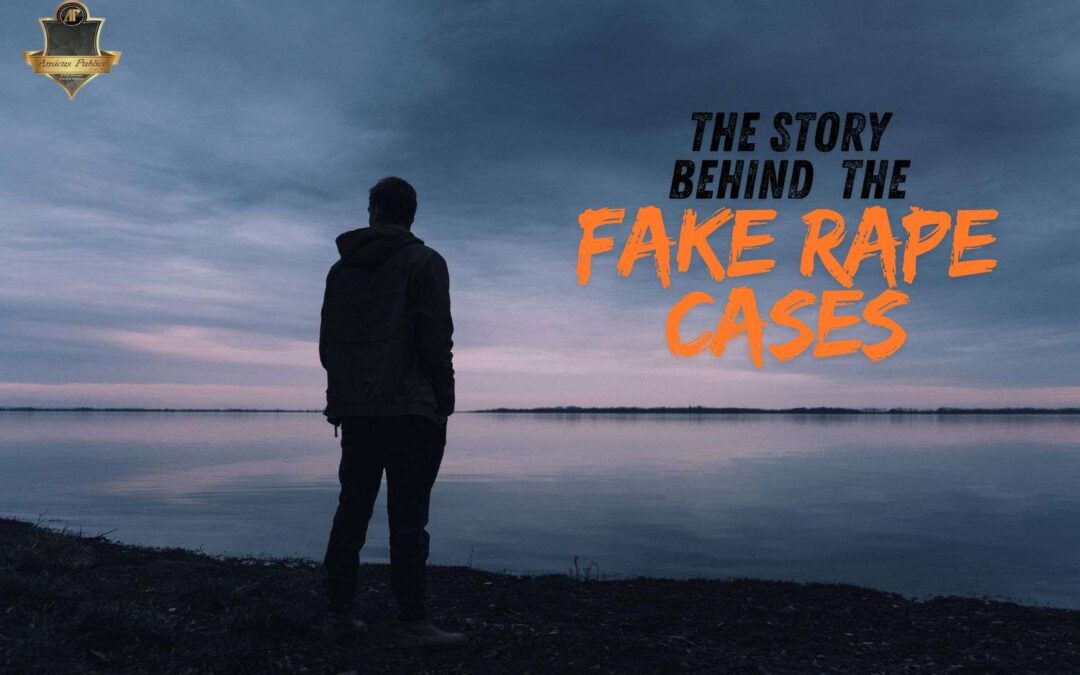We used the word “story” because there is always a victim’s and accused’s backstory attached to every rape case. Additionally, Section 376 of the Indian Penal Code, which punishes rape, carries a severe penalty in our nation. However, girls frequently take advantage of this provision by fabricating a tale against the male to trap him in it.
In cases of rape, “Consent” is crucial since so many of the time, girls abuse this portion.
This analysis aims to give a thorough account of blackmailing, fake rape cases, the impact on accused individuals, as well as the social stigma and harm to their reputation.
False Accusation: A fake rape case involves an accusation of rape or sexual assault that is knowingly fabricated by the accuser. This means that the accuser is aware that the incident did not happen or did not occur in the way they are alleging.
Characteristics:
- Deliberate Fabrication: In a fake rape case, the accusation is made deliberately, knowing that the accused individual is not responsible for the alleged crime.
- Evidence: In most cases, false accusations are eventually exposed through lack of evidence or contradictions in the accuser’s story.
- Legal Consequences: Making a false accusation of rape can have serious legal consequences for the accuser, including criminal charges such as perjury or obstruction of justice.
The National Crime Records Bureau (NCRB) report for 2021 states that over 4,000 rape incidents were recorded fraudulently. Furthermore, after a police inquiry, more than 11,000 cases of women being kidnapped forcibly were found to be untrue. The number of false rape cases has skyrocketed to 55% during the past five years, while the number of real rape cases has decreased in the same time frame.
In 2017, when a total of 46,984 rape cases were under investigation, 2,556 cases were found to be false. The percentage of false cases in 2017 stood at 5.4%. Over the past five years, while there has been no significant increase in actual rape cases, there has been a 55% rise in falsely reported rape cases.
Rape as defined by Section 375 of the Indian Penal Code:
- A man is said to commit “rape” if he—
- (a) penetrates his penis, to any extent, into the vagina, mouth, urethra, or anus of a woman or makes her do so with him or any other person;
- (b) inserts, to any extent, any object or a part of the body, not being the penis, into the vagina, the urethra, or anus of a woman or makes her do so with him or any other person;
- (c) manipulates any part of the body of a woman so as to cause penetration into the vagina, urethra, anus, or any part of the body of such woman or makes her do so with him or any other person;
- (d) applies his mouth to the vagina, anus, or urethra of a woman or makes her do so with him or any other person;
- Under the circumstances falling under any of the following seven descriptions:
- Against her will.
- Without her consent.
- With her consent when her consent has been obtained by putting her or any person in whom she is interested in fear of death or of hurt.
- With her consent when the man knows that he is not her husband and that her consent is given because she believes that he is another man to whom she is or believes herself to be lawfully married.
- With her consent when, at the time of giving such consent, by reason of unsoundness of mind or intoxication or the administration by him personally or through another of any stupefying or unwholesome substance, she is unable to understand the nature and consequences of that to which she gives consent.
- With or without her consent, when she is under eighteen years of age.
- When she is unable to communicate consent.
And the punishment is defined in Section 376 of the Indian Penal Code, as
Whoever commits rape, shall be punished with rigorous imprisonment of either description for a term which shall not be less than ten years, but which may extend to imprisonment for life, and shall also be liable to fine.
Case Study
Recent Cases Highlighting False Rape Accusations:
- The Allahabad High Court: The court quashed a rape and POCSO case against an accused after the victim stated that he had not committed any sexual offense against her. Her mother filed the false case to extract five lakh rupees from the accused, who is now her husband.
In the High Court of Allahabad: Pravin Kumar Singh and Others … Applicants vs. State of U.P. and Another Opposite Parties 2023 SCC Online All 131
- The Allahabad High Court: The court observed that it is very unfortunate that nowadays, in “maximum cases,” women are filing false FIRs under the POCSO/SC-ST Act, using it as a “weapon to grab money” from the state. This practice should stop.
In the High Court of Allahabad: Ajay Yadav vs. State of UP and 3 others 2023 Live Law (AB) 254
- The Jharkhand High Court: The court has issued an order for a CBI investigation into a case where a female constable allegedly filed a false rape accusation against her male colleague. The directive was issued following a petition filed by the accused, Anil Kumar, who sought a high-level inquiry and compensation for the 13 months he spent in jail.
In the High Court of Jharkhand at Ranchi 2024 SCC Online Jhar 1037; Anil Kumar vs. State of Jharkhand and Others … Respondents.
Impact Analysis
False Allegations of Rape Accused Sufferings
A trial court defined the misery of the individual charged with false rape in the following terms, even after acquittal:
Accused of False Charges Consequences and Sufferings
These ‘victims’ in falsified cases cannot be ignored,” the FTC judge said in his words. A fraudulent accusation of rape contributes to tragedies in the lives of the accused. His whole future has been broken, his family is lonely and crying and his life has been devastated. And even after the court acquittal, it is really challenging to get out of shock, trauma, mockery and embarrassment of having been arraigned in a rape case.
Response and Solution
- Strengthen Evidence Collection & Investigation:Ensure that all accusations are investigated thoroughly and impartially, with proper collection and preservation of evidence. Use trained investigators who understand the nuances of sexual assault cases and can accurately assess the evidence.
- Introducing Penalties for False Accusers:In alignment with the District Court in Uttar Pradesh’s Bareilly, all courts should impose appropriate punishments and penalties for the misuse of the law against innocent individuals. This approach ensures the equal protection of human rights for the accused and guarantees that justice is delivered to the wrongfully accused.
Conclusion
In conclusion, the misuse of rape laws through false accusations is a serious issue that can have devastating effects on the lives and reputations of those who are wrongfully accused. While ensuring justice for genuine victims of sexual assault is crucial, it is equally important to safeguard the rights of the accused and protect them from harm caused by fraudulent claims. Strengthening evidence collection and investigation processes, alongside imposing penalties on those who falsely accuse others of rape, are key steps to ensuring that justice is delivered fairly and impartially. By addressing these challenges, the legal system can uphold the integrity of the law and provide justice for all parties involved.

